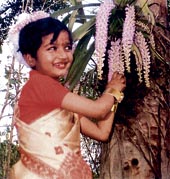 |
| The magic of Bihu has taken over the entire city. Picture by Eastern Projections |
The rain gods could not have smiled down on the city at a better time. With Rongali Bihu just a few days away, the city is sparkling with the sights of spring. Pre-monsoon showers have painted the parched land green and the setting is perfect for revelling in the festive spirit. Everywhere — from nature’s display of vibrant colours to the rhythmic beats of the dholiya’s drums — the magic of Bihu has taken over.
As she soaks in the spirit of the season, septuagenarian award-winning author Nirupama Borgohain reminisces about the city and how it used to celebrate Bihu in the days gone by.
“I have literally lived my entire life in the city. I was born and brought up here. The one thing that strikes me most about Guwahati is the immense change it has witnessed in the last two decades,” smiles Borgohain, dressed in her trademark mekhela chador; a bright vermilion dot on her forehead.
“Earlier, Bihu meant getting together with near and dear ones. It was a time when we all used to meet, greet each other and just enjoy the warmth of togetherness. Now the times are changing. I have nothing to complain about changes in our lifestyle, for change is inevitable. It is a part of our life. But when we talk about ‘change’, we must see whether that is taking us on a good or a bad path,” she says.
The cerebral author minces no words while expressing her resentment against the degradation of moral values among the city’s denizens. “I am not here to do moral policing, but as an elder, especially during traditional festivals like Bihu, it hurts that in our race to satisfy our materialistic urge, we have lost our morality and stooped low to get what we want. And that is reflected in the chaos and confusion surrounding us,” she sighs.
Recalling her childhood days, Borgohain said those were the times when the city was at its best. Be it the natural surroundings or the sense of belonging among the residents, the entire city was like one close-knit family.
“Now we are almost rootless. Nobody considers the city to be his or her own. It seems people are in the city for their own vested interest. Once the interest is served, they will all leave the city in the lurch,” says Borgohain, whose pathbreaking Assamese novel Abhijatri won her the Sahitya Akademi Award in 1996.
The author has so far penned as many as 30 novels, several collections of short stories, anthologies of essays, children’s books, a travelogue and an autobiography.
Apart from the Sahitya Akademi Award, she has been conferred the Saswati Award and the Prabina Saikia Award. She has also been honoured by the Asam Sahitya Sabha.
The multifaceted Borgohain taught in various colleges before switching to journalism. The former editor of Assam-based magazines Janajiban, Sanchipat and Chitrangada now contributes to a number of dailies and weeklies. Most of her literary works are a reflection of her experiences in the city.
“I express myself best through the written word. Knowingly or unknowingly, this city shapes my work,” she smiles.
The senior author, known for being a perfectionist, views the spurt in Bihu-related journals and magazines in recent times as a welcome trend.
“Although the habit of reading is on the wane, the increase in literary matter on Bihu and related topics is generating some interest in books,” she says.
“Old age does not permit me to hop from one bihutoli to another, but the mushrooming TV channels give a feel of the celebrations all over the city. I wish everyone a happy Rongali Bihu. May this Bihu bless us with a beautiful future,” is her parting message.
A staff reporter










